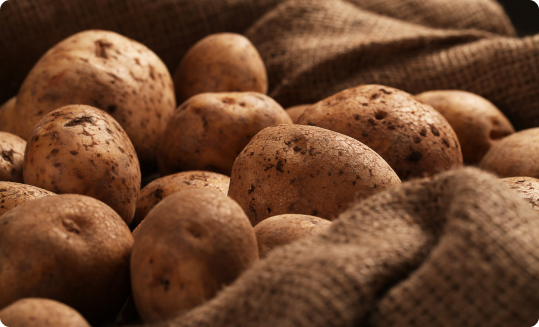The sweet potato is a dicotyledonous plant that belongs to the morning glory family, Convolvulaceae. Its large, starchy, sweet-tasting tuberous roots are used as a root vegetable. They're high in fiber and antioxidants, which protect your body from free radical damage and promote a healthy gut and brain. They're also incredibly rich in beta carotene, which is converted to vitamin A to support good vision and your immune system.The young shoots and leaves are sometimes eaten as greens. If you enjoy sweet potatoes, you can absolutely enjoy them daily. You can grill, smash, bake, mash and even air-fry them.

Sweet potatoes are the perfect example of a carbohydrate that's high-nutrient and low in sugar, sodium and saturated fat. It's exactly what diabetes experts recommend. You can still eat sweet potatoes if you have diabetes. The fiber content in sweet potatoes can help reduce spikes in your blood sugar.
Sweet potato has several benefits that make it worth including in your weight loss diet. So, by incorporating it into healthy meals and watching your portion sizes, you may find that it does support your weight loss goals and results in getting rid of unwanted belly fat. Sweet potatoes are a nutritious and filling food that can be a healthy part of a weight loss diet. However, there is no one specific "best" time to eat sweet potatoes for weight loss. It is more important to focus on the overall balance and timing of your meals throughout the day. To reduce belly fat, it is important to focus on overall weight loss through a combination of a balanced diet, regular exercise, and maintaining a calorie deficit. Incorporating sweet potatoes into a nutritious diet can contribute to overall weight loss. They are a tremendous source of nutrition not only for you, but also your microbiome.
Your gut is made up of various microbes and bacteria that, when in balance, aid in the breakdown of nutrients and improve digestion — they even shore up your immunity. While all sweet potatoes contain vitamin A, the yellow flesh variety has substantially more of it. Beta-carotene and vitamin C help regulate your immune system and boost your body's natural protection against infections. We use the yellow flesh variety to produce Hills Frozen Sweet Potato Chips and Hills Sweet Potato Flour. Sweet potatoes are great sources of potassium, magnesium, and calcium to help you relax. Swap a sweet potato for whatever you eat right before going to bed.


Eating potassium-rich sweet potatoes helps promote a healthy heart. Higher potassium intake allows you to excrete more sodium to lower your blood pressure and reduce your risk for heart disease. Sweet potatoes are also lower on the glycemic index, meaning that they are less likely than regular potatoes to make your blood sugar spike. Sweet Potatoes May Help with Liver Damage from Excessive Alcohol Consumption. Anthocyanins in purple sweet potatoes are also associated with improving liver damage from alcohol abuse. No, yams and sweet potatoes are not the same. Yams have rough, dark brown skin that is often compared to tree bark, and their flesh is dry and starchy like a regular potato. Sweet potatoes have smooth reddish, pinkish or light brown skin, softer flesh (when cooked), and a sweet flavor.
Sweet potato has more beta-carotene than apple, however, apple contains more lutein + zeaxanthin than sweet potato. Sweet potato has more thiamin, riboflavin, niacin, pantothenic acid, Vitamin B6 and folate. Both sweet potatoes and apple are high in dietary fiber. Sweet potato has 60% less sugar than apple. Though they can both be part of a healthy diet, sweet potatoes are generally healthier than regular potatoes, partly because of their incredibly High vitamin A content.
In a nutrition battle between a banana and sweet potato, the sweet potato would come out ahead. A baked sweet potato has the same calories per gram as a banana, yet has one gram more fiber and five grams less sugar per medium serving. Of the thousands of vegetables available today, sweet potatoes are considered one of the most nutritious. The orange- (or sometimes purple) fleshed vegetables are loaded with minerals and A, B, and C vitamins. This has led to sweet potatoes being called a superfood by many.